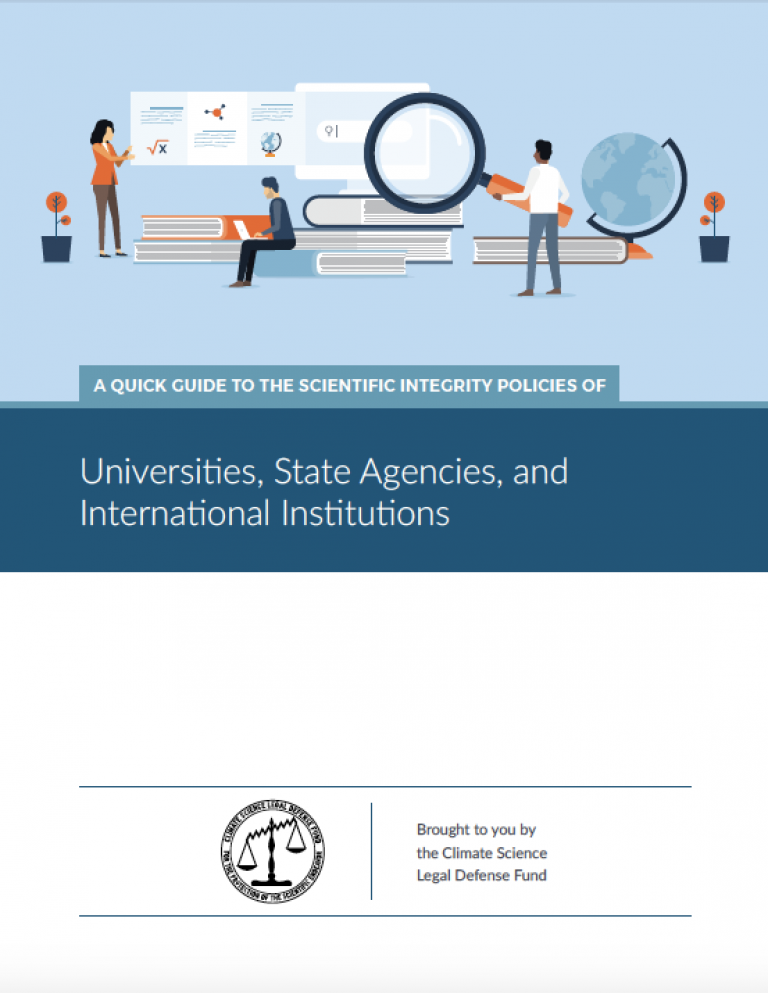COVID-19 Shows that Research Institutions Need Stronger Scientific Integrity Policies

The COVID-19 pandemic illuminates the crucial role scientists at university, state, and local laboratories in the United States and abroad play in protecting public health and safety—and shows that global research must be done without undue interference.
With this in mind, today we published a free resource for scientists: A Quick Guide to the Scientific Integrity Policies of Universities, State Agencies, and International Institutions.
The guide describes how these institutions generally structure their scientific integrity policies, what the policies cover, and the processes for enforcing them.
COVID-19 demonstrates that research facilities must foster sound research practices and a strong culture of scientific integrity—especially with university researchers playing critical roles in this crisis.
These scientists are developing potential drug treatments for COVID-19, addressing the pressing need for more equipment to treat those affected, and modeling scenarios for reopening the economy, among other notable contributions. Proposals to ease shelter-in-place orders rely heavily on university researchers doing even more to help increase the nation’s testing capacity.
But university labs feel the impact of politics carrying more weight than science and public well-being, and federal pressures appear to hinder the lab’s efforts.
For example, in January, the U.S. Centers for Disease and Prevention Control (CDC) declined to adopt the test for COVID-19 developed by the World Health Organization. Instead, the CDC created its own, more complicated test, which turned out to be faulty, leading to a catastrophic testing delay. As this unfolded, labs at universities around the country worked swiftly to develop tests.
The process of obtaining an Emergency Use Authorization (EUA) from the Food and Drug Administration (FDA) that labs needed to start conducting their tests was also inexplicably slow. The EUA process is meant to be flexible and allow the FDA to move quickly in emergencies—something it did relatively well during the 2009 H1N1 epidemic.
Yet flexibility and speed are the opposite of what university labs encountered when they tried to fill the gap left by the faulty CDC tests. The labs were left hamstrung, and the U.S. ended up weeks behind on testing. In another upsetting example, South Dakota’s public health laboratory had tremendous trouble securing the reagents it needed to run tests from the CDC and had to stop testing all together.
These sobering events demonstrate the devastating consequences of politics interfering with science. President Trump and others in his administration were reluctant to acknowledge the severity of the rapidly growing public health crisis and risk economic disruption in an election year. The administration’s efforts to downplay inconvenient scientific findings mirror its approach to longer-term crises like climate change.
Avoiding political pressure in research is a core tenet of most scientific integrity policies adopted by federal scientific agencies in the U.S. However, some of these policies—including the CDC’s—are missing key provisions and don’t adequately protect research from scientific integrity abuses. While the lack of protections for researchers is well-established, particularly climate scientists, the COVID-19 catastrophe also demonstrates that the scientific integrity policies of all federal agencies and academic and state research institutions must prohibit political interference in research.
Attacks on science and scientists at the federal level since Trump took office are well-documented by the media; we also record them in our Silencing Science Tracker. Fewer stories focus on the impacts of this anti-science culture on state and academic research institutions. But there are consequences. In 2017, anecdotal reports said university scientists were avoiding using the term “climate change” in grant proposals to steer clear of negative attention from the administration.
Most research universities and a few state agencies have policies that govern the conduct of their research. Unfortunately, many of these policies do not include key topics such as prohibiting retaliation against anyone who reports misconduct or coercive manipulation of scientists. Instead, the policies primarily focus on narrow concepts such as plagiarism and data fraud. These topics are important, but limiting policies to specific issues does not reflect the range of threats that scientists face in trying to conduct their research.
University and state policies should include broader concepts of scientific integrity. Protecting against political interference in science is a critical first step in ensuring that the research conducted by state and academic institutions is credible and reliable.
Researchers facing scientific integrity issues should contact us for advice about their situation. Write to lawyer@csldf.org to request a free, confidential consultation with one of our attorneys.